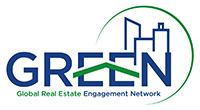Workstreams
GREEN operates through three dedicated workstreams, each aligned with the priorities of GREEN:
- Listed & Non-Listed Engagement Workstreams: these two workstreams focus on indirect investors (as shareholders) engaging with publicly listed and non-listed real estate companies/funds
- Systemic Workstream: this workstream focuses on lifting systemic barriers that prevent the real estate industry from speeding up decarbonization
Together, these workstreams contribute to a more transparent, climate-resilient, and future-proof real estate sector. A detailed explanation of each workstream is provided below.
Listed & non listed workstream
As environmental factors are becoming increasingly important in real estate, the members of GREEN see it as their fiduciary responsibility to act by integrating climate risks into investment policies. In the listed and non listed engagement workstreams GREEN members conduct targeted engagements as shareholders in listed real estate companies or non listed funds.
Environmental and regulatory pressure on real estate
Environmental factors are becoming increasingly important in real estate. Legislative and regulatory requirements for curbing emissions to ensure net-zero compliance by 2050 at corporate level are ever more likely, while at the other end of the spectrum there is increasing focus on measures that target tenants and owners. Real estate investors too are increasingly required to demonstrate and report on the sustainability of their investments. These developments coupled with the physical risks associated with global warming mean that real-estate portfolios are becoming increasingly vulnerable to climate change on a range of levels.
Fiduciary responsibility to act
In light of the impact of these factors on the risks and returns of real estate companies and funds, the members of this workstream see it as their fiduciary responsibility to take ESG and climate risk factors into account in their investment policies. In these workstreams members are engaging as shareholders in listed real estate companies (universe: FTSE EPRA NAREIT developed) or non listed funds. All members are assigned at least two companies or funds to engage, and thereby sharing the workload. Engagements of our members are generally led by one or two members, and are based on discussions on the four topics below, which are outlined in more detail in a collectively endorsed investor statement:
- Governance & target setting
- Implementation
- Disclosure
- Certified data
Academically reviewed dashboard
GREEN in collaboration with the Maastricht University has translated this investor statement into indicators which are tracked in a dashboard, and all companies engaged by our members are analyzed via this dashboard. This dashboard allows our members to easily prepare for engagements and also to track progress. This dashboard is exclusively available to our members and is validated by Maastricht University.
Systemic workstream
We need a real estate market where carbon and energy data are shared and used like financial data to inform decision-making. Energy-efficient and low-carbon buildings offer financial advantages, such as lower operational costs, stronger tenant demand, and resilience to future building performance standards and carbon pricing mechanisms. As the current landscape of sustainability certifications and industry standards is fragmented, it is time to streamline ESG data complexity and ensure access to meaningful, investor-relevant metrics. This workstream is focused on lifting the systemic barriers that prevent the industry from accelerating decarbonization.
With the current landscape of sustainability certifications and industry standards being fragmented, each framework uses different data points and definitions. Many of these frameworks consolidate all sustainability aspects into a single score—often without transparent access to the underlying data. Research shows that high scores in many sustainability frameworks do not necessarily correlate with strong energy and carbon performance at the asset or portfolio level.
This results in three key challenges:
- Mispricing of Climate Risk
Smaller or less sophisticated investors, tenants and other stakeholders often rely on broad ESG scores as a proxy for reduced climate risk. This can lead to mispricing, failing to reflect the true value of energy-efficient and low-carbon assets. - Lack of Comparable Data for Sophisticated Investors
Larger institutional investors recognize that energy and carbon performance data is critical but struggle to assess risks and opportunities due to inconsistent, non-standardized climate data. - Rising ESG Reporting Costs & Administrative Burden
The ever-growing ESG reporting requirements increase costs and divert resources away from value creation and strategic investment decisions.
A call for coordination, not reinvention
It’s time to streamline ESG data complexity and ensure access to meaningful, investor-relevant metrics. These metrics should enable better pricing of brown discounts and green premiums—ultimately aligning the market with true financial and sustainability performance. To address these challenges, a coordinated effort is needed across the investor community.
The goal of this workstream is not to create yet another framework, but to:
- Ensure existing standards align with the definitions investors want to use
- Secure investor access to the most relevant climate metrics
- Identify the metrics that truly matter through collaboration within the investor community
- Drive widespread adoption of these metrics, ensuring that benchmark providers and standard setters align their methodologies accordingly
Ask us a question
"*" indicates required fields


